April 25 to May 1
Notable martial arts heroine Hsu Feng (徐楓) likes to recount the story of how she almost became a factory worker. But a job offer for a minor role in a film from the Union Film Company (聯邦電影公司) came a few days before she was to start at the factory, and she immediately signed a six-year contract.
Her stepfather protested. The job involved long hours, he said, and the pay was low. But the 16-year-old insisted.
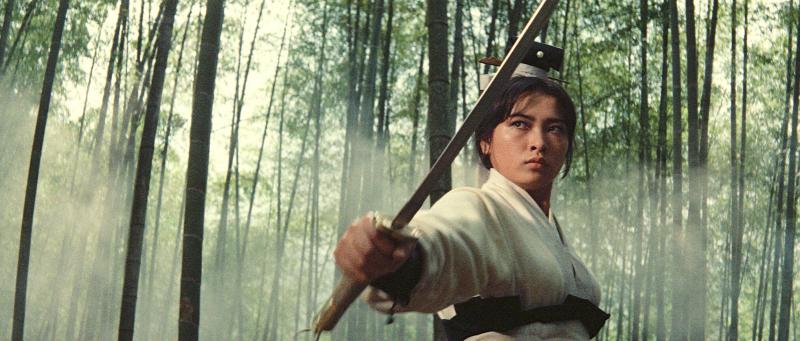
Photo courtesy of Taiwan Film and Audiovisual Institute
“I’m not pretty. I don’t have a great figure. I’m reserved and I’m not even a good student. Yet Director [King] Hu (胡金銓) chose me out of 3,000 applicants. Why wouldn’t I sign?”
It paid off. After her first role, in Hu’s 1967 hit Dragon Inn (龍門客棧), Hsu was cast as the sword-wielding renegade lead in the 1971 A Touch of Zen (俠女).
Hu’s tenure with Union Film lasted for two films, but it sparked a wuxia (武俠, martial arts heroes) craze in Taiwan, Hong Kong and other Chinese-speaking locales. Hsu starred in four more of Hu’s acclaimed movies.
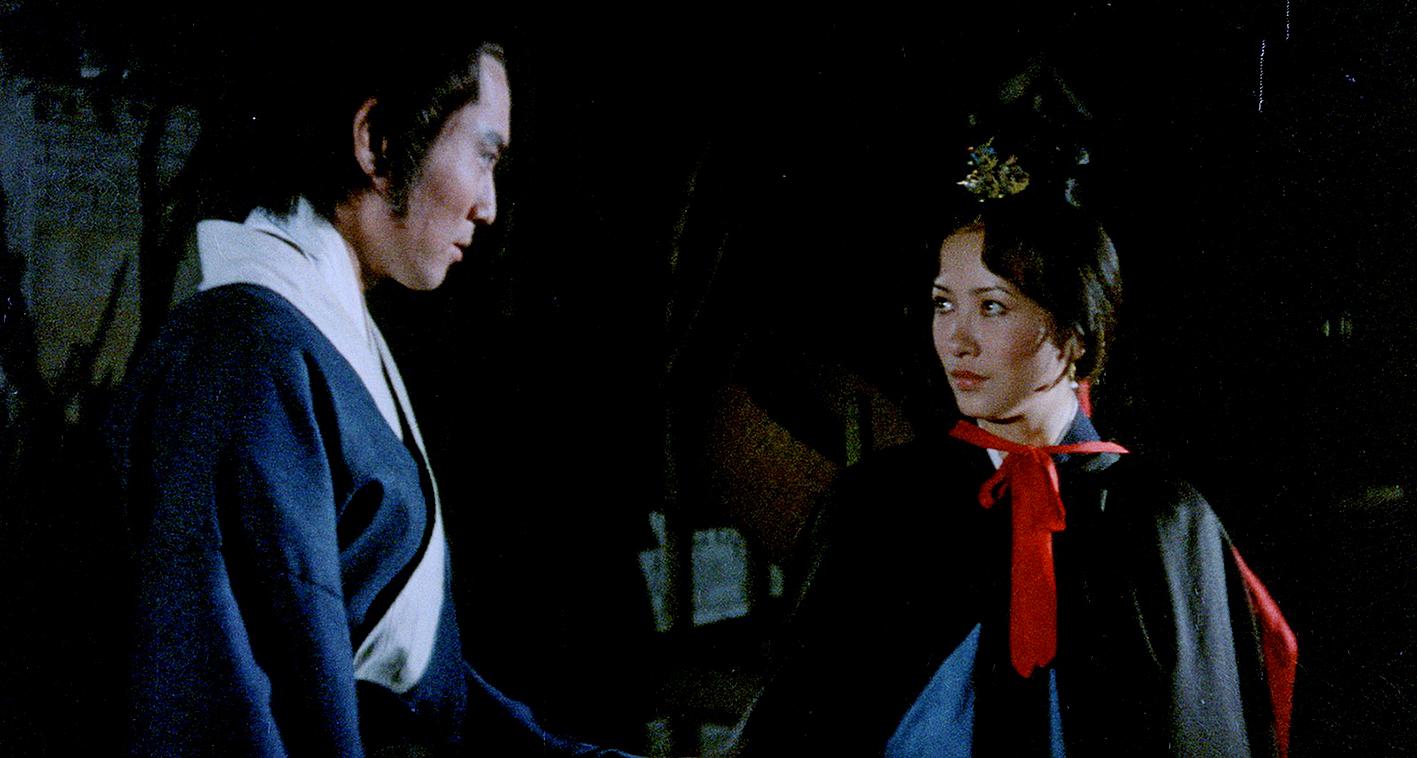
Photo courtesy of Taiwan Film and Audiovisual Institute
Their work was spotlighted this year by the Taiwan Film and Audiovisual Institute (國家電影及視聽文化中心) to mark the 25th anniversary of Hu’s death. (His 80th birthday is on April 29.)
The exhibition, Wuxia Genre in Taiwan (江湖島嶼:武俠在台灣), currently on view at the Taiwan Film and Audiovisual Institute in New Taipei City, closes today.
MARTIAL ARTISTS
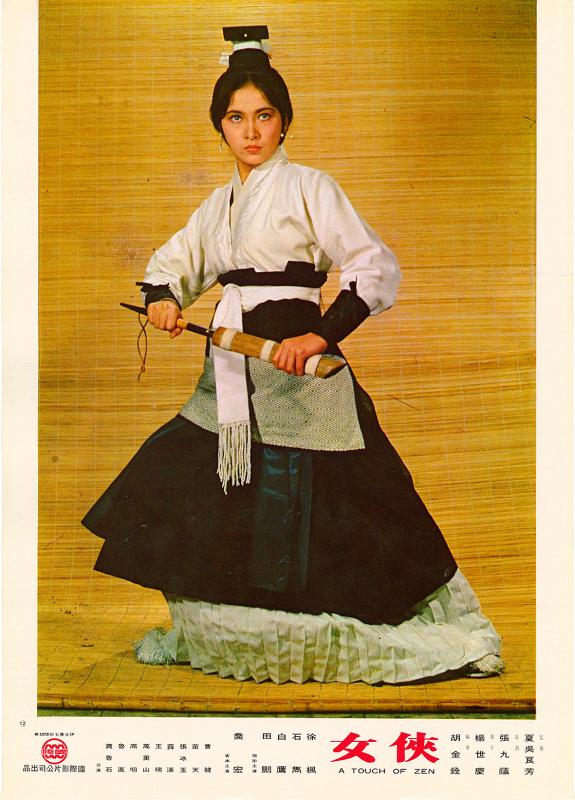
Photo courtesy of Taiwan Film and Audiovisual Institute
Hu was born into an artistic and intellectual family in Beijing, fleeing to Hong Kong at the age of 18 after the Chinese Communist Party seized control of China. He got his start in the movie industry as an actor with the famous Shaw Brothers studio. Despite having no martial arts training, he was versed in traditional opera and was able to adapt.
Hu eventually found his talent in directing, and his first feature, the 1966 Come Drink with Me (大醉俠), received unexpected success. Hu, who was reportedly unhappy with his employers, jumped ship to Taiwan’s Union Film Company. Hu was perhaps encouraged by his former colleague and mentor Lee Han-cheung (李翰祥), who had also relocated to Taiwan to launch Grand Motion Pictures (國聯影業有限公司).
Founded in 1953, Union Film at first distributed films from Hong Kong and other countries, only dabbling in a few original low-budget productions. In the 1960s, they purchased about 15,000 ping of land in Taoyuan and built a state-of-the-art film studio dedicated to Mandarin movies. Hu was one of their prime recruits.
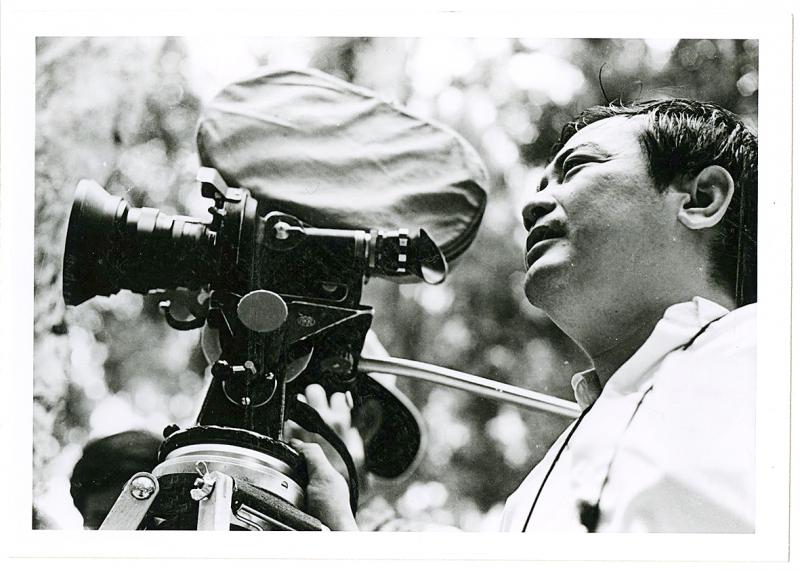
Photo courtesy of Taiwan Film and Audiovisual Institute
Lin Liang-wen (林亮妏) writes in A Hundred Years of Taiwan Film History in 22 Movies (二十二部電影裡的百年台灣電影史) that Hu had a penchant for choosing average-looking actors, teaching them martial arts and thespian techniques and turning them into top-notch entertainers.
Both of Hu’s movies with Union Film were set in the Ming Dynasty, and it’s said that he was so obsessed with every detail that he obtained “special permission” to enter the National Palace Museum’s archives to see a long scroll painting of the Wanli Emperor on tour. Photography was forbidden, so Hu and two of the museum’s staff copied it by hand.
At that time, a 16-year-old Hsu was desperate to get a full-time job. Her father died when she was five, and her mother’s new husband treated like a servant, forcing her to take care of her step siblings and cook all the family meals.
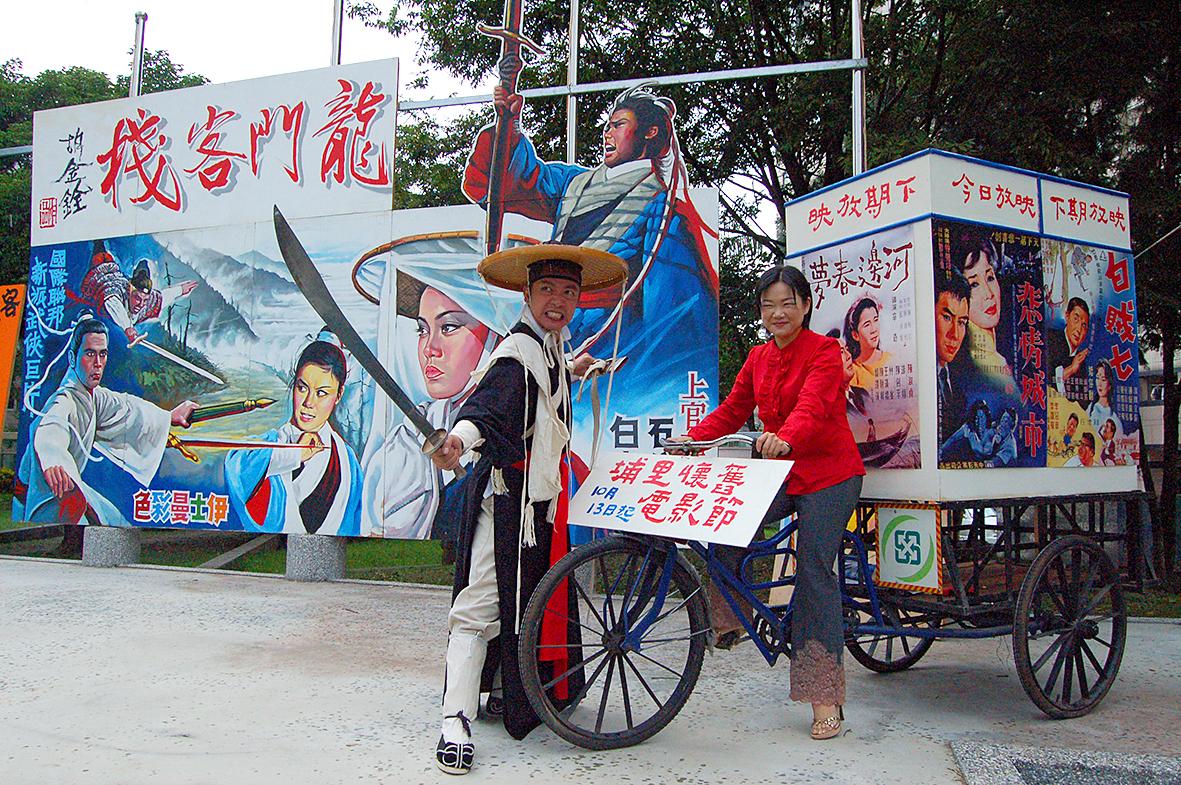
Photo: Tung Chen-kuo, Taipei Times
Hsu joined Union Film at a meager salary just to make ends meet, but her second production made her an instant star.
A HEROINE IS BORN
Dragon Inn was a massive hit, topping the box office in Taiwan and breaking records for Taiwanese films in Hong Kong and Southeast Asia. A Touch of Zen was notoriously difficult to make due to conflicts between Hu and Union Film. In the meantime, he and three well-known directors made Four Moods (喜怒哀樂) to help Union Film pay off its debts. Hu helmed the “anger” segment.
While Hsu was notoriously shy, she was known to rise up against injustice. Media reports tell of the time she scared off armed gangsters who came to the film set to collect protection money.
In A Touch of Zen, Hsu portrayed Yang Hui-chen (楊慧貞), a skilled fugitive wanted by the Eastern Depot secret police agency run by evil eunuchs.
The fighting had to be as real as possible, and Hsu recalls in a Taiwan Panorama article of a sequence, when she accidentally slashed the forehead of her antagonist in the film, played by Tian Peng (田鵬), resulting in six stitches and 11 days in the hospital. Fortunately, it was a wide shot that didn’t require real swords. Had it been a close-up, the result could have been fatal.
Although the movie wasn’t as successful as Dragon Inn, it was groundbreaking on many levels. The fight choreography was very intricate, and its bamboo fight scene has become a staple of the genre — Ang Lee (李安) paid tribute to it in Crouching Tiger, Hidden Dragon (臥虎藏龍). The films also garnered considerable Western attention, and A Touch of Zen won the Technical Grand Prize at the 1975 Cannes Film Festival.
GOLDEN HORSES
Hu’s output was small for those times, and his next collaboration with Hsu to receive widespread attention was the 1979 Legend of the Mountain (山中傳奇), which was 184 minutes long. According to Taiwan Panorama, the movie was edited — without Hu’s permission — into a 110 minute version to fit theater screening times. Although critics marveled at the stunning camerawork and careful melding of numerous traditional arts into the visual tapestry, they agreed that the plot was terrible.
Fortunately, the Golden Horse committee received the full version, and it won six awards, including best film, best director and best cinematography.
Hu’s works sparked a martial arts craze, with notable Union Film releases including Kuo Nan-hung’s (郭南宏) The Swordsman of all Swordsmen (一代劍王) and Tu Chung-hsun’s (屠忠訓) A City Called Dragon (龍城十日).
Hsu won her first Golden Horse best actress award in 1976 with Tu’s Assassin (刺客), and her second one in 1980 with The Pioneers (源). However, her greatest accolade came as a producer for Farewell My Concubine (霸王別姬), which won the 1993 Palme d’Or at Cannes.
In 2017, she was given the lifetime achievement award at the Golden Horses, where she thanked Hu for giving her a chance and his “strict training.”
“Movies are in my blood,” she said, noting that she hopes to return to making movies now that her children are grown.
Taiwan in Time, a column about Taiwan’s history that is published every Sunday, spotlights important or interesting events around the nation that either have anniversaries this week or are tied to current events.

The canonical shot of an East Asian city is a night skyline studded with towering apartment and office buildings, bright with neon and plastic signage, a landscape of energy and modernity. Another classic image is the same city seen from above, in which identical apartment towers march across the city, spilling out over nearby geography, like stylized soldiers colonizing new territory in a board game. Densely populated dynamic conurbations of money, technological innovation and convenience, it is hard to see the cities of East Asia as what they truly are: necropolises. Why is this? The East Asian development model, with

June 16 to June 22 The following flyer appeared on the streets of Hsinchu on June 12, 1895: “Taipei has already fallen to the Japanese barbarians, who have brought great misery to our land and people. We heard that the Japanese occupiers will tax our gardens, our houses, our bodies, and even our chickens, dogs, cows and pigs. They wear their hair wild, carve their teeth, tattoo their foreheads, wear strange clothes and speak a strange language. How can we be ruled by such people?” Posted by civilian militia leader Wu Tang-hsing (吳湯興), it was a call to arms to retake

Desperate dads meet in car parks to exchange packets; exhausted parents slip it into their kids’ drinks; families wait months for prescriptions buy it “off label.” But is it worth the risk? “The first time I gave him a gummy, I thought, ‘Oh my God, have I killed him?’ He just passed out in front of the TV. That never happens.” Jen remembers giving her son, David, six, melatonin to help him sleep. She got them from a friend, a pediatrician who gave them to her own child. “It was sort of hilarious. She had half a tub of gummies,

The wide-screen spectacle of Formula One gets a gleaming, rip-roaring workout in Joseph Kosinski’s F1, a fine-tuned machine of a movie that, in its most riveting racing scenes, approaches a kind of high-speed splendor. Kosinski, who last endeavored to put moviegoers in the seat of a fighter jet in Top Gun: Maverick, has moved to the open cockpits of Formula One with much the same affection, if not outright need, for speed. A lot of the same team is back. Jerry Bruckheimer produces. Ehren Kruger, a co-writer on Maverick, takes sole credit here. Hans Zimmer, a co-composer previously, supplies the thumping